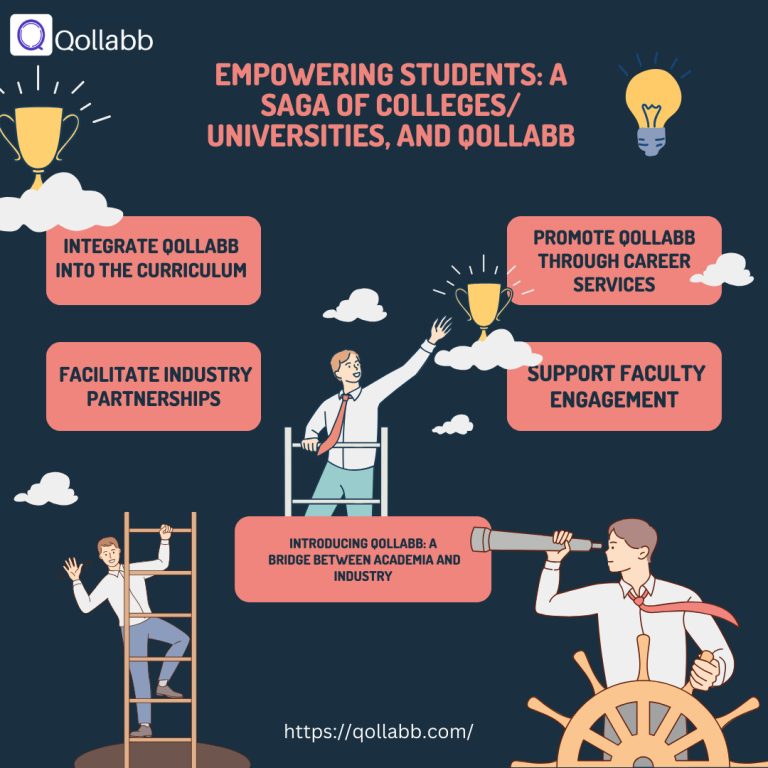In today’s competitive job market, students face the challenge of bridging the gap between academic learning and practical experience. Colleges and universities hold the key to equipping students with the skills and experiences needed to thrive in their careers. One powerful way to achieve this is by leveraging platforms like Qollabb for Student Career Development. Qollabb is a unique initiative that connects students with real-world projects and industry leaders, fostering university-industry collaboration and providing invaluable practical experience. This blog will explore how educational institutions can utilize Qollabb for Student Career Development to enhance their students’ career prospects.
The Role of Colleges and Universities in Career Development
Colleges and universities are pivotal in shaping the future of their students. Beyond imparting theoretical knowledge, they are responsible for preparing students for the professional world. Here’s how they can do it:
- Curriculum Integration: Incorporating practical experiences into the academic curriculum.
- Career Services: Offering guidance and resources for career planning and job search.
- Industry Partnerships: Establishing connections with companies to provide internships and job opportunities.
- Skill Development: Focusing on both hard and soft skills necessary for career success.
Introducing Qollabb: A Bridge Between Academia and Industry
Qollabb is an innovative platform designed to connect students with real projects from various industries. By partnering with Qollabb, colleges and universities can provide their students with opportunities to work on practical projects, collaborate with industry professionals, and gain hands-on experience that complements their academic studies.
How Qollabb Enhances Career Development
1. Real-World Experience
Qollabb enables students to work on actual business projects, providing them with firsthand experience in their field of study. This exposure to real-world challenges helps students apply theoretical knowledge in practical settings, making them more job-ready.
Example: Engineering students can work on live projects with companies, allowing them to apply their classroom knowledge to solve real engineering problems.
2. Skill Development
Working on real projects helps students develop essential skills that are highly valued by employers. These include problem-solving, critical thinking, communication, teamwork, and project management.
Example: Business students can engage in market research projects, honing their analytical and presentation skills.
3. Professional Networking
Through Qollabb, students can connect with industry professionals and mentors. Building these relationships can open doors to future job opportunities and provide valuable career guidance.
Example: A graphic design student can collaborate with professionals in the design industry, gaining insights and potential job referrals.
4. Enhanced Portfolios
Students who participate in Qollabb projects can showcase their work in their portfolios. A strong portfolio demonstrating practical experience can significantly enhance a student’s employability.
Example: An IT student can present completed software development projects to potential employers, showcasing their technical expertise.
How Colleges and Universities Can Leverage Qollabb
1. Integrate Qollabb into the Curriculum
Educational institutions can incorporate Qollabb projects into their curriculum, making them a mandatory part of the coursework. This integration ensures that all students have access to practical experiences.
2. Promote Qollabb Through Career Services
Career services departments can promote Qollabb to students as a valuable resource for gaining practical experience. They can organize workshops and information sessions to introduce students to the platform.
3. Facilitate Industry Partnerships
Colleges and universities can work with Qollabb to establish partnerships with local and global companies. These partnerships can lead to more project opportunities for students and strengthen the institution’s industry connections.
4. Support Faculty Engagement
Faculty members can play a crucial role in guiding students through Qollabb projects. Institutions should encourage faculty to integrate Qollabb into their teaching and provide support for project supervision.
Conclusion
Colleges and universities have a significant role in preparing students for successful careers. By leveraging platforms like Qollabb, educational institutions can provide students with the practical experience, skills, and professional connections they need to thrive in their chosen fields. Integrating Qollabb into the curriculum, promoting it through career services, facilitating industry partnerships, and supporting faculty engagement are key steps to maximizing the benefits of Qollabb. With these efforts, colleges and universities can ensure that their graduates are not only academically proficient but also ready to excel in the professional world.





